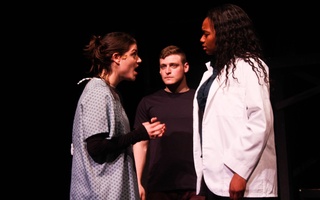{shortcode-8a8887904795cd305a314e6319e86b4827e977a7}“Measure for Measure” has quite a bit of a bad rap as a “problem play” — for good reason. Twisting plots and clever disguises aside, at its heart, it focuses on a deeply unsettling incident of sexual harassment. In their production of William Shakespeare’s work, which showed at the Emerson Cutler Majestic Theater from Oct. 24 to 28, Cheek by Jowl and The Pushkin Theater deftly succeeded in confronting the troubling nature of the material while celebrating the play’s hilarity.
A series of moral tests anchors the turbulent plot. In order to bring order and purity back to his morally depraved city, the Duke of Vienna Vincentio (Alexander Arsentyev) leaves town, leaving his dutiful and frigid subordinate Angelo (Andrei Kuzichev) in charge to clean up the nest of brothel and taverns that are corrupting the city. Shortly after, the Duke goes undercover, posing as Friar Lodowick to observe what ensues. After closing down taverns across town, Angelo apprehends and charges young Claudio (Petr Rykov) with impregnating his lover Juliet (Anastasia Lebedeva). Claudio’s sister and novice nun Isabella (Anna Vardevanian) pleads for a lighter sentence for the offense, trying as hard as she can to soften the new Duke, but is quickly surprised when she is instead propositioned for sex by the lascivious and hypocritical Angelo. She is given an impossible and terrible choice: Claudio’s freedom in exchange for her virginity or her beloved brother’s death.
Though performed in Russian by an all-Russian cast, a panel elevated above the sparsely set stage displayed Shakespeare’s words so that English-speaking viewers could also watch. Fitted in contemporary costumes, the cast succeeded in bringing redemption to the central characters while animating the bawdy ones of its underworld. More than anything, it was the darkly comic side characters who stole the stage, notably Alexander Feklistov as Claudio’s friend Lucio. His lines are naturally imbued with humor, but in the hands of Feklistov the character truly blossomed. His timing, absurd gesticulations, and delivery were impeccable. Arsentyev was also marvelous, heavily leaning into the irony of his character’s situation and largely satirizing the Duke’s savior complex.
For the most part, the simple staging helped to focus the attention on the actors’ craft. A series of industrial hanging lamps created a sober atmosphere, while the harsh lighting also invoked a sense of secrecy due to the many shadows it cast across the stage. Four large red boxes in the formation of a “U” were also constantly present on stage. These were later revealed to be rotating chambers and were used to show different scenes occurring simultaneously.
For the most part, actors delivered their monologues to the audience and to the group of players who were present on stage but not in scenes. This group acted as a silent chorus, reacting to what was occurring or sometimes mimicking the actions of the characters delivering monologues. This often meant that the character referred to in the monologue stepped forward and was spoken to as if truly present, rather than remaining merely figments of the speaker’s consciousness. This choice worked very well, as it added another layer of tension and strain.
The play also featured a number of small waltzes between characters to polka-style Russian folk music. After being told by his sister that he will be put to death and that she will not sacrifice her virtue for him, Claudio begins to play the double bass, sitting on it rather oddly from the side. The dances were brief but good transitions to the next scenes, and added to the strongly Russian identity of this production.
Perhaps where the play seems to go too far is in its decision to blatantly portray Claudio’s and Isabella’s relationship as a sexual one. Of course, there are subtle undertones of incest in the play itself. Critics point to Isabella’s rather sadomasochistic and seductive speeches in the first act or her direct invocation of the word: “Is't not a kind of incest, to take life / From thine own sister's shame?” (3.1.152-3). Yet this depiction wasn’t entirely convincing. During the scene where Isabella visits her brother to tell him about Angelo’s proposition, the siblings fight in a scene that rapidly devolves into what appears to be an aborted sex act. This happens so quickly that it almost might not even have occurred — further suggesting that it need not have occured at all.
Despite this flaw, the production is altogether very fresh and entertaining. With strong performances by the whole cast and a simple but effective set, the production stunned. Even the occasional glance away from the translation never led to any confusion: The players were emotive, clearly attesting to the brilliance of this production.
—Staff writer Aline G. Damas can be reached at aline.damas@thecrimson.com.
Read more in Arts
In 'Origins,' 'Titans' Starts to Get the Gang TogetherRecommended Articles
-
Plans for Dramatic Club PlayAll candidates for the position of business manager and stage manager of the fall production of the Dramatic Club are
-
SPRING DRAMATIC PLANSThe Harvard Dramatic Club will present this year as its annual spring production four one-act plays, which have yet to
-
SPRING DRAMATIC CLUB PLAYSPlans for the spring, production of the Harvard Dramatic Club are rapidly taking definite shape and candidates will be called
-
 'Macbeth': A Riveting New Take on a Classic
'Macbeth': A Riveting New Take on a Classic -
 ‘Next to Normal’ is Anything but Ordinary
‘Next to Normal’ is Anything but Ordinary













